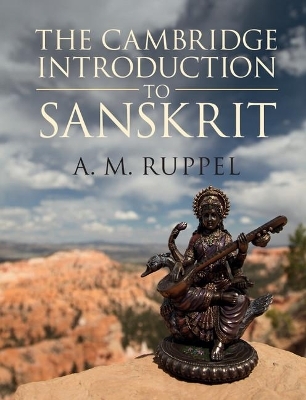
The Cambridge Introduction to Sanskrit
Cambridge University Press (Verlag)
9781107459069 (ISBN)
Ideal for courses in beginning Sanskrit or self-study, this textbook employs modern, tried-and-tested pedagogical methods and tools, but requires no prior knowledge of ancient languages or linguistics. Devanāgarī script is introduced over several chapters and used in parallel with transliteration for several chapters more, allowing students to progress in learning Sanskrit itself while still mastering the script. Students are exposed to annotated original texts in addition to practise sentences very early on, and structures and systems underlying the wealth of forms are clearly explained to facilitate memorisation. All grammar is covered in detail, with chapters dedicated to compounding and nominal derivation, and sections explaining relevant historical phenomena. The introduction also includes a variety of online resources that students may use to reinforce and expand their knowledge: flash cards; video tutorials for all chapters; and up-to-date links to writing, declension and conjugation exercises and online dictionaries, grammars, and textual databases.
A. M. Ruppel was the Townsend Senior Lecturer in the Greek, Latin and Sanskrit Languages at Cornell University, New York for nine years, and is currently Head of Sanskrit at St James Senior Boys' School in Ashford, UK. Ruppel has received the Stephen and Margery Russell Distinguished Teaching Award as well as a grant from the Cornell Center for Teaching Excellence, and is the author of Absolute Constructions in Early Indo-European (Cambridge, 2012).
Acknowledgements; Studying Sanskrit; List of abbreviations; Notes for the reader; 1. Writing Sanskrit; 2. The system of Sanskrit sounds; 2a. Word stress: heavy and light syllables; 3. Road maps: verbs; 4. The present tense; 5. Road map: nominals; 6. a-stems; 7. Vowel gradation and why we need to know about it; 8. Absolutives, ta-participle and infinitives; introduction to internal sandhi; 9. ā-stems; 10. Prepositions and preverbs; 11. Introduction to external sandhi I: consonant sandhi; 12. Imperfect indicative and present potential; 13. ī- and ū-stems; sandhi II: visarga sandhi; 14. Compound nouns; 15. Consonant stems I; 16. Sandhi III: vowel sandhi; 17. Noun formation; 18. Athematic verbs I; 19. Athematic verbs II; 20. Introduction to pronouns; pronouns I; 21. The future tense; middle and passive voice; 22. More participles; pronouns II; 23. Relative and correlative clauses; 24. Consonant stems II; imperatives; 25. Noun stems gradation; consonant stems III; 26. i- and u-stems; 27. The perfect tense I: regular perfect formation; 28. The perfect tense II: irregular and unexpected forms; 29. ṛ-stems, n-stems; the periphrastic future; 30. Secondary middle endings I: thematic verbs; 31. Secondary middle endings II: athematic verbs; 32. Pronouns III: 1st- and 2nd-person pronouns; 33. Desideratives and gerundives; 34. The periphrastic perfect; ta-participles ending in -na; 35. Perfect participles; more comparatives; 36. Absolute constructions; pronouns IV; 37. Numerals; 38. Aorists; 39. Pronouns V: asau/adas-; 40. Some irregular nouns; Appendices: Appendix 1. Devanāgarī practice handouts; Appendix 2. Background; Appendix 3. Reference; Index.
| Erscheinungsdatum | 25.03.2017 |
|---|---|
| Zusatzinfo | 40 Tables, color; 73 Tables, black and white |
| Verlagsort | Cambridge |
| Sprache | englisch |
| Maße | 188 x 245 mm |
| Gewicht | 940 g |
| Themenwelt | Schulbuch / Wörterbuch ► Wörterbuch / Fremdsprachen |
| Geisteswissenschaften ► Religion / Theologie ► Buddhismus | |
| Geisteswissenschaften ► Religion / Theologie ► Hinduismus | |
| Geisteswissenschaften ► Sprach- / Literaturwissenschaft ► Sprachwissenschaft | |
| ISBN-13 | 9781107459069 / 9781107459069 |
| Zustand | Neuware |
| Informationen gemäß Produktsicherheitsverordnung (GPSR) | |
| Haben Sie eine Frage zum Produkt? |
aus dem Bereich


